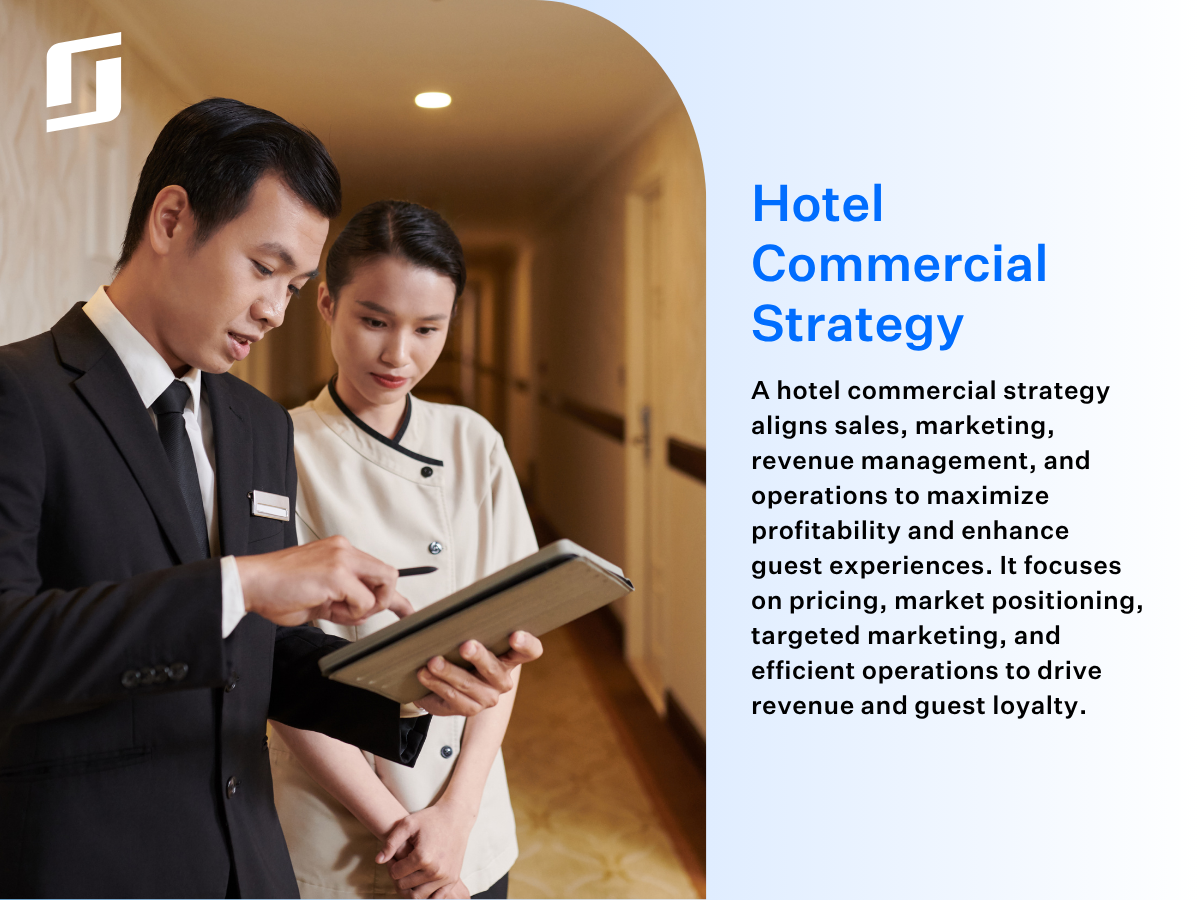What is a hotel commercial strategy?
A hotel commercial strategy is a coordinated business approach that integrates sales, marketing, revenue management and distribution efforts to maximise total hotel revenue. It aims to drive profitability and improve competitiveness in the market for a hotel business.
Rather than operating in silos, a hotel commercial strategy ensures everyone is rowing in the same direction, working collaboratively and productively to drive revenue, enhance profitability and boost the hotel’s competitive edge.
A commercial strategy powers a data-driven mindset, allowing a hotel to respond faster to market trends, more effectively personalise guest experiences, and make smarter pricing and distribution decisions.
This blog will explain in more detail why your business needs a hotel commercial strategy, and offer practical steps on how to successfully create and implement one.
Table of contents
Why should you implement a hotel commercial strategy?
A carefully considered commercial strategy can help a hotel respond to global turbulence, technological advancement, and changes in traveller behaviour.
Hotel businesses can succeed in this ever-changing landscape by reshaping how they operate. This includes identifying market shifts and crafting hotel strategies to adapt to them.
Examples of such shifts include:
- Early engagement: Attention spans are getting shorter, so smart hotels are working to capture the interest of potential guests as early as possible using sophisticated, data-driven marketing strategies.
- Personalisation: The modern traveller expects to be catered to with custom communications, deals and offerings that reflect their needs and preferences. Forward-thinking hotels are implementing systems capable of delivering these personalised experiences.
- Booking flexibility: Between COVID and a rise in global conflicts, there’s now a level of uncertainty to travel that simply didn’t exist in the first two decades of this century. Guests are increasingly looking for flexible booking options, and savvy hotels are offering them.
- Seamless digital experiences: Guests now expect to be able to manage every part of their stay, from the moment they book to the moment they check out. Smart hotels are investing in intuitive digital platforms that give customers that power.
There’s no one trend that a hotel must focus on. Market shifts and changes in consumer behaviour are many and varied, and often overlap. That’s what makes a hotel commercial strategy so powerful – it binds all these individual strands into a single, holistic strategy.
Master your hotel commercial strategy with SiteMinder
Give your team the tools they need to successfully deploy your hotel commercial strategy with SiteMinder’s revenue-driving platform.
Learn more
How a hotel commercial strategy can maximise profit & increase efficiency
The ultimate goal of any commercial hotel sales strategy is simple: to generate more revenue and profit. A good strategy does this by lighting a clear path to that growth – one that unifies the entire team around a goal, and describes the steps that need to be taken in order to achieve it.
One common element of a hotel commercial strategy is a focus on direct revenue, which cuts out intermediaries like OTAs that can charge significant commission fees. A more direct relationship with the guest also enhances the experience you can offer them, by giving you the data points you need to personalise and customise every touchpoint.

6 tips for a successful commercial hotel sales strategy
How do you create, implement and optimise a successful hotel commercial strategy? The following guidelines are a great place to start.
1. Leverage data
Hotels are often a collection of very separate teams that only speak to one another when strictly necessary. But this can result in critical information being siloed within each department. The more data you have at your disposal, the more powerful the insights you can gain, so the most successful hotels pool their data resources together, sharing information openly between departments and crunching the numbers to see where risks and opportunities lie.
2. Review your systems
The only way to fully leverage data and run your hotel business efficiently is with the help of smart hotel software. The best systems will take care of the low-value busywork while presenting endless opportunities for automation, allowing you and your team to focus on the high-value stuff, like making every guest experience memorable.
3. Adopt an RMS
A revenue management system (RMS) uses real-time and historic data to power dynamic pricing, where room rates are adjusted based on demand, seasonality and competitor movements. Some RMSs feature forecasting tools that predict future booking trends and optimise your inventory well ahead of time.
4. Visibility on distribution channels
While direct bookings are the best bookings, distribution channels offer you unmatched reach and will likely remain a key source of bookings for your hotel, no matter how much direct business you manage to win. Your hotel commercial strategy should therefore work to enhance your visibility across GDSs, OTAs and metasearch.
5. Upselling and cross-selling
Commercial hotel sales strategies should also consider how to maximise the value of every guest, most notably by identifying opportunities to upsell and cross-sell. Examples include offering package deals, room upgrades and add-on services, both as part of the booking process and when the guest is on-site.
6. Assemble a strategy team
A holistic hotel commercial strategy will combine the disciplines of sales, marketing, distribution and revenue management and span all your departments – every team plays a part in attracting and pleasing guests, after all. A cross-functional commercial strategy team should be assembled to provide voices and perspectives from every part of the business, and avoid potential blind spots or oversights during strategy development.
Using tools in a hotel commercial technology strategy
Once you’ve assembled your strategy team, you need to give them the tools they need to succeed.
Your overarching hotel commercial strategy should be paired with a hotel commercial technology strategy, as smart tools will play a key role in any worthwhile effort to enhance your business.
A platform like SiteMinder, for example, is designed to provide deep levels of business intelligence powered by real-time data, and which can automate any number of operational tasks to free your team from the shackles of low value busywork.
SiteMinder can help you to capitalise on data like never before, by placing information and insights drawn from every department into a single platform. As you begin to implement your hotel commercial strategy, these smart insights can create a feedback loop that informs your strategic decision making, optimising your efforts over time.


